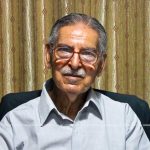Shankar Dayal Sharma
A President Forged in Fire
Nikita Gupta
Shankar Dayal Sharma, the ninth President of our country, was an exemplary leader and statesman and his long and varied political and scholarly career is a series of continued successes. The distinguished educationist and lawyer behind the political figure is less known.
Born on August 19, 1918 in the princely state of Bhopal, he belonged to a simple Brahmin family whose protective and guiding influence in righteousness was to stay with him all his life. He was always a bright student. He started college at St. John’s, later moving on to Agra College and Punjab College.
His association with Lucknow University is a matter of pride for Lucknowites. He studied English Literature, Hindi and Sanskrit at the university. He was also a brilliant sportsman participating in rowing, swimming and athletics. He also captained these teams during his time at the university.
He taught Law at the university for nine years, leaving behind a trail of successful students. Later his dedication to social causes and continued efforts in improving the society around him was to earn him the prestigious Chakravarty Gold Medal for social work, conferred on him by the Lucknow University.
He also forms part of the Allahabad University’s proud past alumnus’ 42 members.
His educational ascent only found higher grounds- he was called to the Bar from Lincoln’s Inn; later he became a Fellow at Harvard Law School. He was elected Honorary Bencher and Master of Lincoln’s Inn and Honorary Fellow, Fitzwilliam College, Cambridge. The University of Cambridge awarded him with the degree of Doctor of Law (Honoris Causa).
He also taught Law at Cambridge University and he was the treasurer of the Tagore Society and Cambridge Majlis there.
As much as these valued schools of education gave him, he returned in glorious terms through his work and ambition, their respect reflected in the various honours conferred on him. Remarkably the International Bar Association awarded him with the ‘living legends of law award of recognition’ for his commitment to the rule of law and his contribution to international law.
His erudition led him to various educational institutes. He was Pro-Chancellor of Sagar University (1956-1959). During his tenure as Governor of Andhra Pradesh, Punjab and Maharashtra, he was Chancellor of 22 Universities in those States and also Rector of the University of Hyderabad. During his tenure as Vice-President of India he was Chancellor of Delhi University, Punjab University, Pondicherry University, and many others. He was also Chairman of the Central Sanskrit Board. He was a man of great and diverse learning.
It was in 1940 as he started practicing law in Lucknow that he became associated with the ‘freedom struggle movement’, motivated by Gandhiji’s call for Quit India Movement. He also joined the Indian National Congress around this time.
His first political stint happened in around 1946.The Nawab of Bhopal wished to continue his reign of Bhopal as a princely state. Sharma took part in protests against this claim and was later arrested and imprisoned for violating norms of public meetings. But the Nawab had to ultimately give in. Sharma became the Chief Minister of Bhopal in 1952 and remained so until the state’s reorganization in 1956. during his term he worked relentlessly to remove the jagirdari system in India.
During the intervening years he supported Indira Gandhi’s political efforts even as they were met with friction.
He became the President of the Madhya Pradesh Congress Committee, then the General Secretary of the Indian National Congress and further served as the President of the Indian National Congress; it was finally in the year 1974 that he was made the Union Minister for Communications under the leadership of Indira Gandhi and served till 1977.
He served as the Vice President of India for a five-year long term till 1992, when he took over the proceedings from Ramaswamy Venkataraman and was made the ninth President of India.
During his stay as the President of India, it was his responsibility to swear in three Prime Ministers and was actively involved in the ceremonial matters. However, because of poor health, he did not run for the next term of Presidency.
He was titled ‘Rashtra Ratnam’ by the Shankracharya of Sringeri for his dedication and commitment to the nation. He was a radical thinker and active politician. He supported new developments and reforms and had progressive views on all matters from education to women empowerment.
“We must recognize that human development today is poised at the cross roads. The choices we make and the paths we seek to follow will determine how humanity will exist in the generations to come…Children, their welfare and development, are a subject unique in significance and compelling urgency. Representing as they do our lives relived, we need to devote to them the utmost attention” -words of wisdom that still hold stark relevance too.
“There is a predicament of ‘the girl child’. From life expectancy to literary rates, from school enrollment ratios, from employment to inheritance, there is hardly any society in the world where women are treated at par with men. This wrong and unfortunate discrimination is extended to the girl child”.
During the time of Sikh protests, he was the Chief Minister of Punjab. And his position caused him deep personal loss. His daughter Geetanjali Maken and son-in-law Lalit Maken, a Member of Parliament and promising politician were killed in the riots.
“Communalism begets communalism. Ultimately, none gain; all lose, when communal thinking holds sway over us”, he had believed.
Pluralism has been central to India’s intellectual and spiritual heritage from ancient times. Respect for all religions and recognition of all religions as equally valid paths to truth constitute a national tradition.
He was passionate about his work and all his life was spent in improving the state of affairs of this country through varying means. During a session of the Rajya Sabha ,which he was presiding over as the Vice-President in 1990, members created a ruckus protesting, disrupting the proceedings. Dr. Sharma is said to have broke down in anguish; he left the hall saying he could not be a part of this ìmurder of democracyî. His emotion brought some order back into the session.
Atal Bihari Vajpayee, who was nominated as the Prime Minister by him despite his being from the opposite side, has said about him “President with a mind of his own, was a politician of high values, a distinguished parliamentarian, and a great scholar. His brilliant academic and political career was a saga of dedication and abiding commitment to the pursuit of higher learning and public service”.
He died in December 1999 due to a major heart attack.
He was a simple kind man, witty and directed, patriotic and poised. The Pontiff of Shravanbelagola gave him the title of ‘Dharamratnakara’.
Writer is a student and her passion is painting
(Published in The Lucknow Observer, Volume 2 Issue 17, Dated 05 August 2015)




